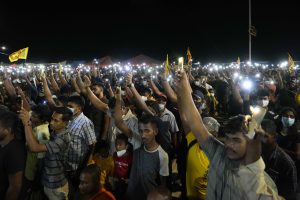Sri Lanka has seen a wave of unprecedented protests around the country calling for the resignation of President Gotabaya Rajapaksa, nicknamed “Gota.” The protesters are telling Gota to “go home” – and rightly so.
The severe economic crisis has affected Sri Lankans from every community and religious backgrounds. This is the first time I have witnessed Sri Lankans from all walks of life standing side by side to call for the overthrow of a president. Rajapaksa has been exposed as corrupt and incompetent.
However, the Rajapaksas weren’t always viewed in a negative light. In 2019, shortly after the Easter attacks, Gotabaya Rajapaksa was overwhelmingly popular among the country’s Sinhalese community. At that time, minorities such as the Muslim community that I belong to and the Tamils were yet again the target of racial and religious discrimination and unjustified crackdowns.
Muslims in Sri Lanka were made the target of hate campaigns speared on by the government under Rajapaksa’s watch. The atrocities of the Easter attacks, which Muslims strongly condemned, were weaponized by the government in order to gain power. As a Sri Lankan Muslim myself, I knew far too well that the government wanted to spur divisions right from the onset of their re-election, both into the presidency and in parliament, where Gotabaya Rajapaksa’s brother Mahinda serves as prime minister.
Now the same people who once were the Rajapaksas’ avid supporters have realized that the president they elected sowed the seeds of propaganda in the form of anti-Muslim hate campaigns to turn communities against each other. It is the Rajapaksas’ worst nightmare to see Muslims, Hindus, Christians, and Sinhalese Buddhists stand united on the streets calling for them to “go home,” but that is exactly what is happening now in the country.
The current economic crisis has reached such severity that the entire cabinet resigned but Gotabaya Rajapaksa and his brother Mahinda continue to remain in power, despite mounting pressure for them to leave. They not only fail to acknowledge the public demands, but even had the audacity to spread hate by blaming “extremists” who they claimed were “Muslim” for the protests. However now Sri Lankans understands the propaganda being spread and will not be swayed into turning on each other – which is exactly what the Rajapaksas want in order to remain in power.
I have family in the country who, like many Sri Lankans, are out peacefully protesting on the streets because they have no fuel, no milk, no access to medication, and no electricity for hours on end. With the protest chant of “Gota go home” unmet, more and more protesters are joining on a daily basis.
For Sri Lanka’s Muslims, this is a familiar scene. The Muslim community in Sri Lanka has had held protests in recent years against the government’s atrocities and human rights abuses, but their demands for justice continued to remain unheard.
Many Muslims were put in prison without evidence or trial after Rajapaksa came back into power in 2019. The Rajapaksas also led a tirade of Islamophobic policies such as banning face coverings for Muslim women and closing Islamic schools. In addition, many Sri Lankan Muslim shops, homes, and businesses came under attack by extremist mobs and Muslims were attacked while the police looked on and did nothing. Despite numerous lobbying efforts by Muslims both in Sri Lanka and internationally, no action was taken by the government, which preferred Sri Lanka’s communities to be divided.
Many minorities in Sri Lanka who have suffered years of discrimination spurred on by the Rajapaksas, such as the Tamil minority, welcome a united approach against the leadership of Gotabaya and Mahinda. Under the Rajapaksas’ leadership, nepotism was widespread; in fact most of the key positions in government were all taken by the Rajapaksas own relatives, including Mahinda’s son as well as two other brothers. The Rajapaksas are hoping that a desperate Cabinet reshuffle to eliminate the worst excesses of nepotism will placate the protesters; so far they have been proven wrong.
While the Rajapaksas live a lavish lifestyle with fancy cars and luxury holidays shown off on display on social media, the Sri Lankan people have to suffer shortages of basic necessities. What might be new for the Sinhalese population has been already been experienced by minorities in the country such as Muslims and Tamils, who have always had to face hardships and stand up for their rights over the years. Such calls for basic human rights remained unmet. It is now up to the people of Sri Lanka to realize that a government run by corrupt leaders will never allow Sri Lanka to be united and prosper.
It is now time not only for “Gota to go home” but also for him and his brothers to be held accountable for the numerous human rights violations, abuses of power, and misconduct the Rajapaksa family has put minorities through. It is hoped this time it won’t just be minorities calling for accountability and change, but the whole of Sri Lankan citizens uniting collectively against oppression.
































